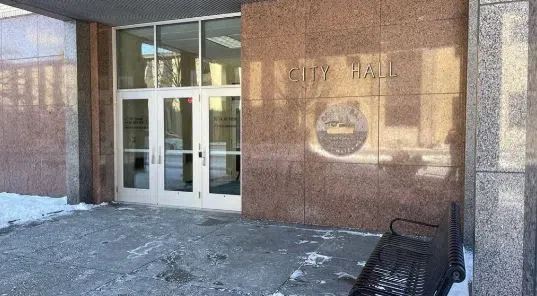GREEN BAY, WI (WTAQ-WLUK) – A federal judge made several motions rulings in Green Bay’s favor Tuesday, as it defends a lawsuit challenging its one-time use of surveillance recording equipment in the hallways of City Hall — but the overall case was not dismissed and will continue.
Green Bay installed the security cameras with audio-recording capability sometime before December 2021. In August 2022, Janet Angus requested details of audio surveillance equipment, which the city provided.
A lawsuit was filed in February 2023, shortly before the mayoral election. A week later, the city’s Park Committee recommended the ending of the recordings. A judge entered a temporary order to halt it on March 2. Days later, the City Council prohibited audio surveillance at City Hall.
The plaintiffs — the Wisconsin State Senate, State Sen. Andre Jacque, and former Green Bay Ald. Tony Theisen — sued the City of Green Bay and Mayor Eric Genrich.
Since the case was moved to federal court in September, the parties have been engaging in pre-trial motions, including motions to dismiss by Green Bay.
Judge William Griesbach’s 21-page decision Tuesday addressed several issues.
Among the rulings:
Participation of the State Senate as a plaintiff
The city argued the State Senate should be dismissed as party to the case, while the plaintiffs argued it has standing in its role overseeing the laws of the state. But the judge agreed with the city’s analysis.
“But the enforcement of the State’s criminal laws is the responsibility of the executive branch, not the legislature. Moreover, this is a civil suit seeking damages for injuries allegedly sustained by individuals. The State Senate makes no such claim. Thus, even if it is unnecessary to decide the State Senate’s standing for the case to proceed, dismissing the State Senate as a party where it clearly lacks standing will eliminate confusion and streamline the case for more expeditious resolution. The State Senate will therefore be dismissed as a party to the suit for lack of standing,” the order states.
Claims for declaratory relief
Green Bay asked for two of the claims to be dismissed, arguing the ‘declaratory relief’ the plaintiffs sought were made moot by the City Council’s decision to end the recordings. The plaintiffs argue the claims should continue, as a predicate for their damage claims. The judge sided with the city.
“I conclude that it is appropriate to dismiss Plaintiffs’ claims for declaratory relief here. The claims for declaratory relief add nothing to the case other than avenues for additional argument and expenditure of resources. Counts I and VI are therefore dismissed in their entirety, and that portion of Count III seeking declaratory relief is also dismissed,” the ruling states.
Overall case dismissal denied
The city asked for the entire to case to be dismissed, “because they fail to allege that they had a reasonable expectation of privacy over their conversations in the hallways of City Hall” The plaintiffs want the case to continue. And it will, the judge said.
“Senator Jacque and Theisen allege sufficient facts to allow the court to draw the reasonable inference that their private conversations were intercepted by the listening devices installed by Mayor Genrich. Plaintiffs allege that their conversations took place in the hallways of City Hall where the audio recordings were installed. They describe the layout of those hallways, which allow for conversations not to be overheard. They also allege that the devices operated continuously and without notice to the public while City Hall was open. Thus, drawing all reasonable inferences in favor of Plaintiffs, they plausibly allege facts sufficient to support the existence of a reasonable expectation of privacy in their recorded conversations in City Hall. The fact that at this stage of the proceedings, before discovery has occurred, Plaintiffs cannot, or decline to, identify the specific conversations they believe were intercepted is not a reason to dismiss their complaint,” the ruling states.
Mayor Genrich’s status in the case
The city argued Mayor Genrich should be dismissed as an individual defendant due to his ‘qualified immunity’ in his role as mayor. But the precedent of other cases means he remains as defendant, the judge wrote.
“These cases were sufficient to place public officials on notice that surreptitiously recording private conversations, even in an area accessible to the public, violates the Fourth Amendment, and by extension, Wisconsin’s statutory and constitutional protections as well. Thus, because Plaintiffs state a claim for a violation of a clearly established right, their claims will not be dismissed on qualified immunity grounds,” the ruling states.
There are currently no hearings set in the case. Griesbach’s order directs the clerk to arrange a scheduling conference, and allow for discovery to continue in the case.










Comments